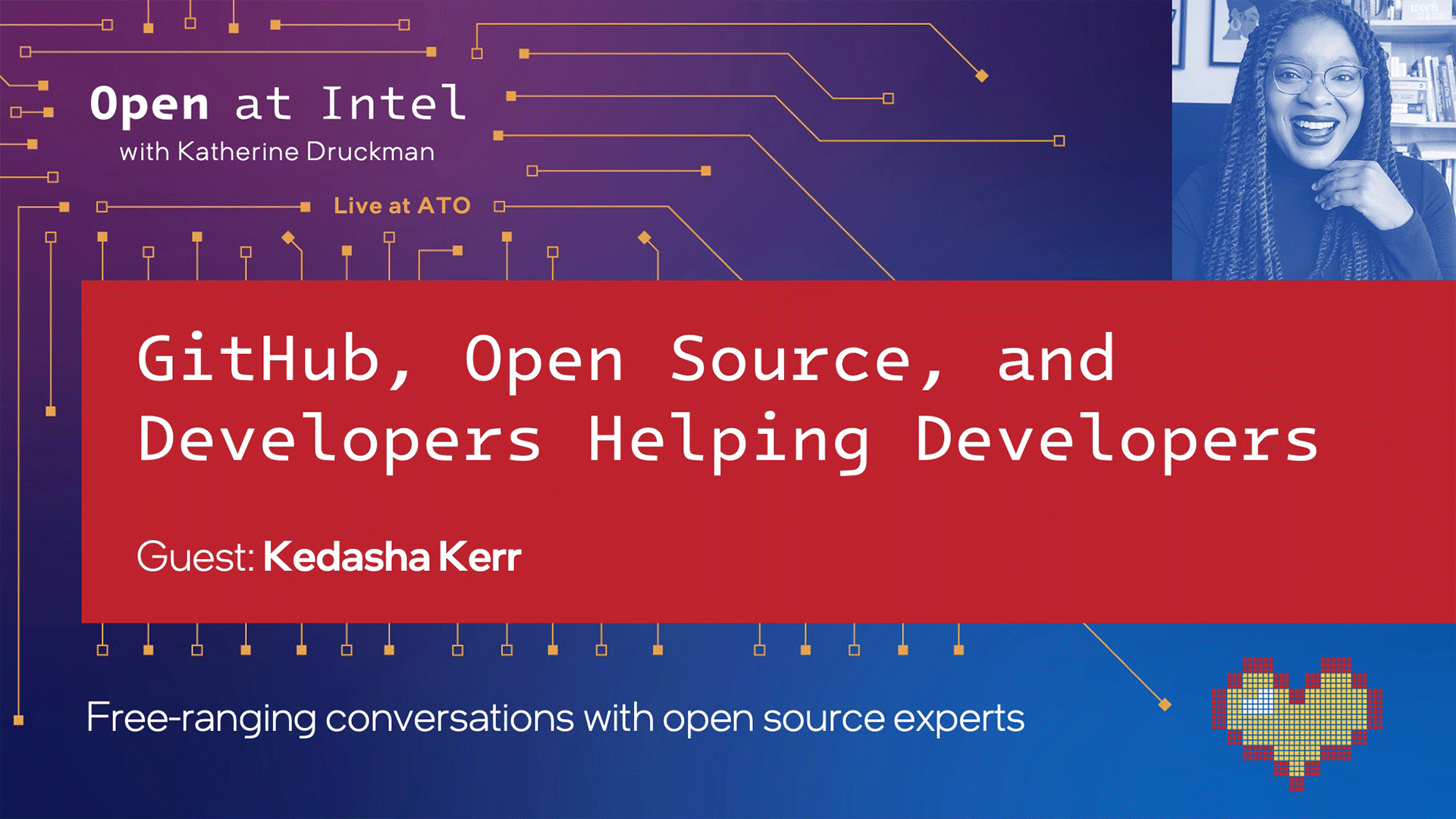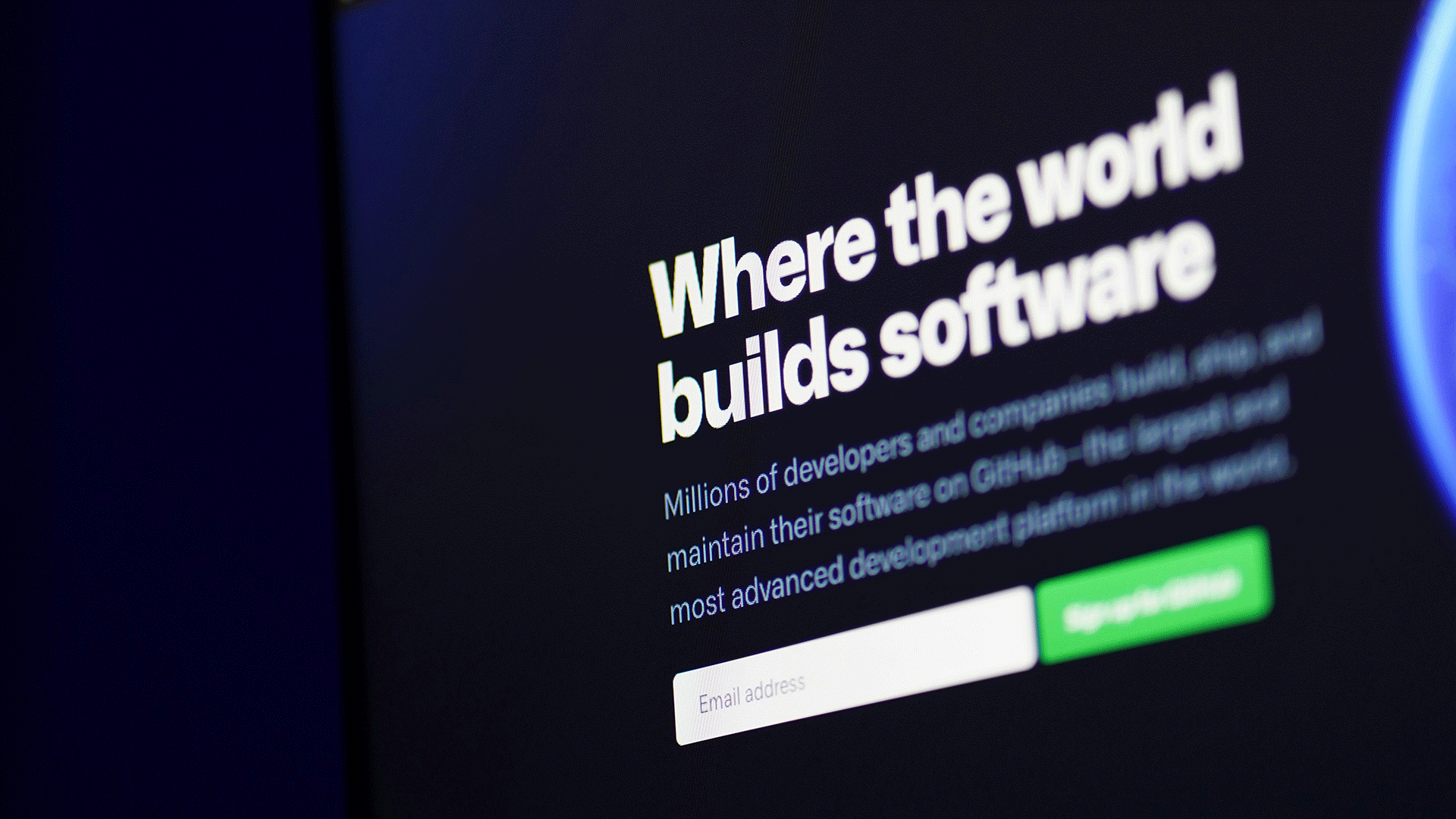Kedasha Kerr took a nontraditional path to become a developer advocate at GitHub, and now that she’s here, she’s passionate about helping beginner developers everywhere find their footing in the open source world. On this episode of the Open at Intel podcast, Kerr talks about her journey from social worker to developer advocate, underutilized GitHub Actions and tools, and advice for beginners, including how to improve your GitHub profile to land a job.
Listen to the full episode here and follow Kerr on Instagram for more insights. This conversation has been edited and condensed for brevity and clarity.
There’s No Right Way to Join Open Source
Katherine Druckman: We seem to have a lot in common. We’re both advocating for developers, and we took nontraditional paths to get here.
Kedasha Kerr: We absolutely did. I was a social worker, and it was really tiring work. I was also tired of being broke because social workers work very hard and they’re not paid. One day, I was scrolling on Instagram of all places, and somebody posted that they learned how to code in a few months, and now they’re earning a bajillion dollars. I was like, I too want a bajillion dollars, how can I get there? I clicked the link to freeCodeCamp, which led me to Codecademy, a one-year intense, crying-my-eyes-out-every-day boot camp.
I got a scholarship to Grace Hopper in 2019, and then I got a job at Grace Hopper, my very first developer job in the banking industry. I worked there for two and a half years. It was great, but I wasn’t using my best skills. So I built up my own online communities. I was doing podcasts, conferences, workshops, blog posts—everything a developer advocate does. I pivoted again and here we are.
Katherine Druckman: People with nontechnical backgrounds bring important perspectives. As a social worker, you understand how to handle conflict, which is incredibly practical in open source and community-driven development.
Kedasha Kerr: We need more empathetic developers, and developers who think about the impact to the end user. Even as technologists, we need to be more empathetic. For example, a lot of people are scared of AI right now. It’s our responsibility to listen, be empathetic, and use 101 language to explain what it is and how it works.
We Need More Women Developers
Katherine Druckman: I’m really happy to see more women get into coding. What’s your advice to other women—of any age or background—who want to learn to code?
Kedasha Kerr: freeCodeCamp is a great place to start. Their resources are tremendous and vast. They’re currently working on partnering with universities, if they haven’t already, to offer college credits so you can work toward degrees. They have front end, back end, databases, DevOps, all sorts of stuff for you to learn. Try to complete at least one module and if you like it, figure out the next step—maybe a boot camp, going back to school, or self-studying. And find a community online. You can join me on Instagram at @itsthatlady.dev.
GitHub Actions You Should Know About
Katherine Druckman: You’re a developer advocate at GitHub. Will you tell us about that?
Kedasha Kerr: I do a lot of things, but it essentially means that I educate developers on how to use the GitHub platform more efficiently. I do social media content, talks, blog posts, and one-on-one sessions to help people debug. I also do demos so you can learn to build it as well.
I have a soft spot in my heart for beginners, specifically the people who know absolutely nothing about GitHub or technology. One of the most asked questions I get is, how do I even use GitHub? If that’s you, go to skills.github.com. We have a full suite of courses on all our features to help you get started.
Katherine Druckman: You get to share fun and new GitHub Actions. What are your favorite GitHub actions that people may not know about?
Kedasha Kerr: One of my favorites is the GitHub bot that deletes stale issues. Sometimes you finish working on an issue and forget to close it because you’ve moved on to the next one. That bot goes in after a certain number of days have passed and reminds you, “Hey, are you still working on this?” If you don’t interact, it closes it for you. It’s helped our DevRel team at GitHub clean up so many issues that were waiting for somebody to close.
There’s an action for deployment. You can auto-magically deploy your Firebase hosting. There’s also one for NPM publishing, and if you’re into blogging, you can auto-magically deploy your blog posts with GitHub Actions.
More Tools: GitHub CLI and GitHub Copilot
Katherine Druckman: Beyond GitHub Actions, what are other things we don’t know about GitHub that we really ought to?
Kedasha Kerr: GitHub CLI is a tool that a lot of people don’t use. You can clone repositories and create issues, projects, and code spaces. You can pull or push remote changes to or from a code space. I believe you can create and add your SSH keys. There’s a lot of stuff you can do on the GitHub CLI. I recently wrote a blog on 10 things you can do with the GitHub CLI.
I have a series called GitHub Tips and Tricks where I share little tidbits of things you didn’t know you could do with GitHub. For example, we recently launched slash commands, which can help you easily create things that are annoying, like markdown tables, and help link to different aspects of your environment. Another thing is if you hit period on your keyboard on any repository, it will open up an IDE that you can make quick changes to. If you hit the comma on a repository, it will open a codespace, which is a full dev environment in the cloud where you can work on bigger tasks and do in-depth coding.
I’d also be remiss if I didn’t mention GitHub Copilot. The most exciting thing about GitHub Copilot is that it automatically generates tests for files. Testing is a whole different skill set because you have to think about the code differently, like what could possibly happen? The GitHub Copilot test generation is my most loved feature. I also love the documentation feature. Those are two things that we don’t have time to do as developers—testing and documentation. Those are the two biggest things I use Copilot for in my daily life.

Optimize Your GitHub Profile
Katherine Druckman: A developer’s GitHub profile is increasingly being used as a sort of resume. Do you have any profile tips for impressing people?
Kedasha Kerr: Make sure all your links are working. You’d be surprised how many broken links are in your profile or in your pinned repositories. If you have a project and it has a front-end component, make sure there are no errors in your console. Make sure that when someone lands on your profile, they know who you are, what you do, what you can offer, what languages and tools you’re able to use. You can also link to external resources like talks you’ve done and blogs you’ve written, and those are things that definitely help you to stand out. Make sure there’s a way for recruiters to contact you because sometimes they will.
Lastly, don’t worry too much about green squares because you’re more than green squares. They’re just a way for you to see what you’ve been up to this month or this year, not necessarily a badge of honor or a way to say, “I’m the best developer ever because I code every day.” Quality is better than quantity.
Helping Beginners Get Started
Katherine Druckman: What are you most excited about in the open source world?
Kedasha Kerr: I’m excited about getting beginner developers into open source. There’s a lot of job opportunity in open source. Companies hire open source contributors all the time because hiring managers think if you’re already in the code base, you can work there.
I made my first open source contribution just this year. It was amazing, but I had a lot of fear before I got to that point. We work in code bases all the time at our jobs, but when it comes to open source, it’s very public, and we worry that people will find out we don’t know how to code. It’s not as scary as we make it out to be in our heads. I truly believe you can do it and I’m here to help you.
To hear more of this conversation and others, subscribe to the Open at Intel podcast:
- openatintel.podbean.com
- Google Podcasts
- Apple Podcasts
- Spotify
- Amazon Music
- Your favorite podcast player (RSS)
About the Author
Katherine Druckman, Open Source Evangelist, Intel
Katherine Druckman, an Intel open source evangelist, hosts the podcasts Open at Intel, Reality 2.0, and FLOSS Weekly. A security and privacy advocate, software engineer, and former digital director of Linux Journal, she’s a longtime champion of open source and open standards.
Kedasha Kerr, Developer Advocate, GitHub
Kedasha Kerr is a developer advocate at GitHub, where she enjoys sharing the lessons she’s learned from her time as an engineer and from her day job talking with other engineers at GitHub and in the wider developer community. Prior to her transition to the world of tech, she worked as a social worker in various government agencies. She finds joy in helping others learn about the tech industry and loves sharing her experience as a software developer. When she’s not building software, you can find her in the kitchen cooking up her favorite Jamaican dishes. Follower her on Instagram and TikTok at @itsthatladydev.
